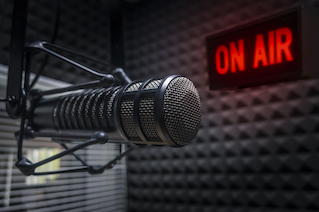This week, former Shadow Chancellor turned Strictly star and Good Morning Britain presenter, Ed Balls, and former Chancellor turned investment banker and Chairman of the British Museum, George Osborne, are launching their new podcast, Political Currency. The former rivals, who’ve developed an unlikely Abbott and Portillo style double-act on Channel 4’s The Andrew Neil Show, become the latest entrants into the already crowded field of political podcasting.
Leading the way are centrist-dad pairing Alistair Campbell and Rory Stewart, hosts of The Rest Is Politics and Leading, with the former regularly placing at the top of Spotify’s podcast chart. According to The Times, the pair are believed to earn around £70,000 a month for the podcast, while their live shows at The Royal Albert Hall sell-out in minutes.
Hot on their heels is The News Agents, presented by a triumvirate of former BBC journalists, Emily Maitlis, Jon Sopel and Lewis Goodall – again reportedly earning a pretty penny for their work. Competing for listens, the BBC has recently expanded Newscast into a seven-day-a-week offering. Meanwhile, almost every major news outlet from The Guardian to The Spectator offers their own equivalent.
The most successful tend to follow a similar format: two hosts, notionally on different sides of the political divide, but often with large areas of ideological overlap, dissect the week’s news in a calm, insightful, and sometimes amusing manner. As Campbell and Stewart put it, they “disagree agreeably”.


Credit where it’s due, two of the first to succeed with this formula were LBC presenter Iain Dale and former Home Secretary, Jacqui Smith, whose For The Many podcast remains required-listening – with live shows across the country and, recently, at the Edinburgh Fringe. The Two Matts, hosted by columnist Matthew D’Ancona and Matt Kelly, Editor-in-Chief of The New European, is a new entrant to the market that also delivers.
But why are political podcasts suddenly so popular? And what does it tell us about the coverage provided by the rest of the broadcast media? The biggest questions are for the established TV channels.
In recent years, the BBC has cancelled shows such as The Sunday Politics and This Week, while Sunday with Laura Kuenssberg has already lost a third of the viewers of its predecessor, The Andrew Marr Show. It’s not hard to see why. Whilst Kuennsberg still does a decent job of interrogating the unfortunate minister who’s been assigned the Sunday media round, the analysis provided by the panel is a victim to the constraints of the format: overly brief and lacking depth.
If you really wanted to understand what’s going on in Westminster in 2023, would you be better served watching a terrestrial political show, or listening to a podcast? The latter wins every time.
Furthermore, the beauty of podcasts is they’ve replaced ‘broadcasting’ with ‘narrow-casting’ – identifying a niche and owning it. What might be considered disappointing viewing figures for a flagship BBC politics programme constitute brilliant listening figures for a podcast, with a huge potential for monetisation. Audiences can also overlap. Most listeners to The Rest Is Politics probably dip into The News Agents, or Nick Robinson’s Political Thinking, or Steve Richards’ Rock & Roll Politics, etc.
With the mainstream TV broadcasters offering a diminished range of political programming, podcasting is stepping into the breach. If you’re a political junkie who wants to listen to a different politics podcast each day, you can.
So good luck to Ed Balls and George Osborne. No doubt there’ll be cynics who think they’re simply jumping onto an over-crowded bandwagon, but they’ll find an audience. However depressing UK politics may be in 2023, podcasting has enriched the way it is discussed and analysed. I’ll certainly be streaming the first episode of Political Currency.












